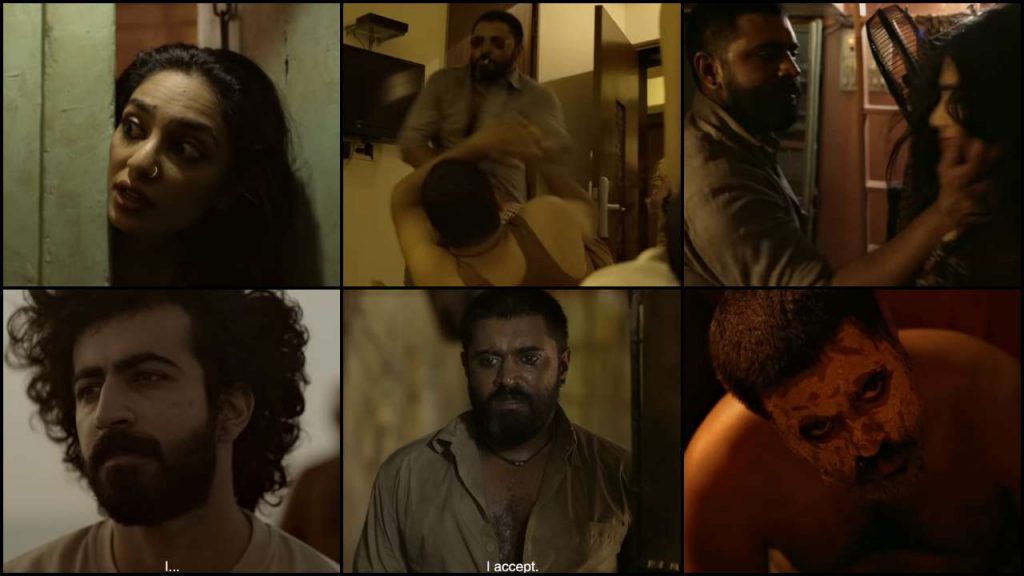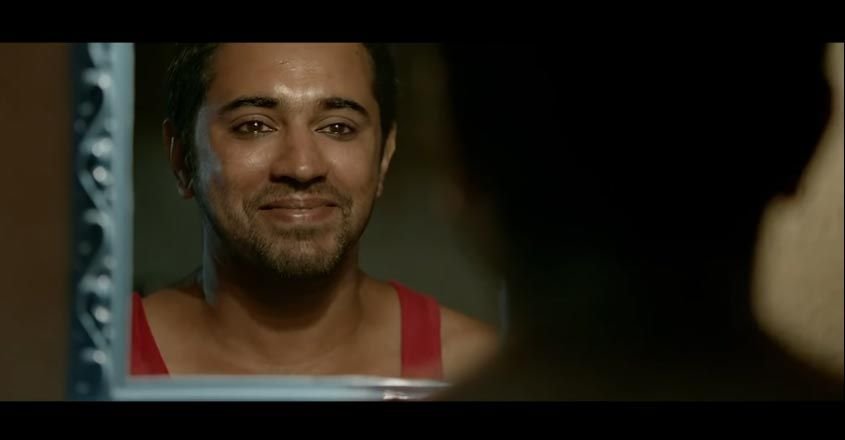“Ours is the century of enforced travel of disappearances. The century of people helplessly seeing others, who were close to them, disappear over the horizon.” English art critic, novelist, painter and poet John Berger’s quote above, is the perfect synopsis of the film without giving anything away. Maybe Berger time travelled, watched Moothon and this line is him regurgitating the film; highly plausible considering all the time travel memes!
Unlike this quote, the further you read this review, the more spoilers I’ll be throwing at you.
Geetu Mohandas’s picturesque tale of love, loss and fading personhood or identity, screams as no other film has, in the recent past. Moothon is the journey of a thirteen-year-old Mulla (played by Sanjana Dipu), who’s looking for their older brother Abdul. They travel from the vast ocean and clear-skied Lakshwadeep islands to the dark and dirty streets of Mumbai’s Kamathipura.
It also narrates the life of a goon/rowdy named Akbar from Kamathipura, Mumbai, played by Nivin Pauly and the love story of a couple in the Lakshwadeep Islands. It’s a tale of violence, physical or emotional, inflicted on people, in public and private spaces.
Moothon, described as a ‘dark fairytale’ on reviews, managed to hold on it while invoking a sense of Grimms’ Fairy Tales. The lighting was minimal and shot in dark spaces and the darkness was literal, figurative and metaphorical on the screen.
Everyday Tales
Moothon, described as a ‘dark fairytale’ on reviews, managed to hold on it while invoking a sense of Grimms’ Fairy Tales. The lighting was minimal and shot in dark spaces and the darkness was literal, figurative and metaphorical on the screen. And the story enveloped another kind of darkness around it and beckoned you to come closer, and take a peek. I learned what a meet-cute is with Kate Winslet on “The Holiday”; I’ve made it my life’s mission to look for meet-cutes, like the one of Gaddam and Saleema in C/O Kancherapalam, exchanging looks while he sells her a 180ml of Mansion house Brandy.
The meet-cute in Geethu Mohandas’s hands happened in a religious ceremony. You’d expect bright light, flowers, swarming crowd, the hustle-bustle of a religious ceremony, and slowly your attention would be drawn to two good looking people stealing glances at each other. Geethu Mohandas does most of the above, except for the flowers. Under harsh white light, surrounded by religious singing and praying and hoards of people, you get to see Akbar participating in the Kuthu Ratheeb.
Kuthu Ratheeb is a ritual performed by a section of the Muslim community, and it involves piercing the body using Knives and steel tools. A graceful Akbar manages to shock you as he cuts himself and bleeds, while still holding your attention. Akbar’s eyes slowly shift to a curly-haired Ameer (played by Roshan Mathew) who walks into the venue, and the juxtaposition of blood, religion, violence with the tenderness of masculinity, love and probable lust, is remarkable.
The Context
The queer stories in Indian films meant Dostana or Shubh Mangal Zyada Saavdhan, and they were both justified to be the ‘conversation starter’. Then Moothon gave me a jolt, and I woke up to notice all the excuses I’d made for why the industry did not make good queer films. There honestly isn’t one good reason why the mainstream hasn’t made a good, honest queer film.
Moothon’s queer love story works because of the real conversations it has between characters instead of a caricature of essential conversations. Or worse, dramatising them to an unrealistic soap opera level intensity. The passion and anxiety Akbar felt on his way to Ameer’s house when he’s home alone, isn’t something just people from the LGBTQIA+ felt or understood. It was an anxiety that’s more universally relatable. Ameer and Akbar never kiss on screen, but the intimacy they shared on-screen is far more real and natural compared to the forced kiss you’d have witnessed on SMZS.

The Actors
The film opens with the voice of Akbar singing a lullaby, and Mulla lying on the white sandy beaches of the Lakshadweep island. It follows up with Mulla running with other children on the sandy white beaches and the ocean on three sides. The song is haunting, and when I heard Akbar singing it in Mumbai again, the two moments juxtaposed in my head and broke my heart. The film’s characters are trying hard to colour within the lines, while the film is drawing from the margins (did you notice this half intentional pun?).
Sobhita Dhulipala plays the mother of a thirteen-year-old, and is a sex worker by profession called Rosy. Sobhita manages to merge into the location, and fit in and not stand out like a sore thumb. Sobhita isn’t sexualised as Indian films do with sex workers, but Rosy is as sexual as street-based sex workers are imagined. She fits the profile, no more and no less. She aids in the progress of Akbar and Mulla’s story.
And then there’s Salim played Shashank Arora. Shashank Arora deserves more praise for pulling off an excellent Salim. He plays the role so well and fills in the lines just enough. The film has round and flat characters, flat characters like Salim and Rosy do what’s required of them for the plot to progress. Akbar and Mulla are round characters whose progress is the plot. Ameer sadly is a more flat character compared to Akbar.
Also read: Film Review: ‘Frances Ha’ Gives An Insight Into Feminist Existentialism
The Production
The costume and make-up team managed to make Nivin Paul look normal, and yet he’ll still manage to stifle your heart. Of course, you’ll want more, nobody can deny, and then Roshan Mathew gets thrown into the mix. The casting directors/ team for Moothon deserves awards. There’s genius-level cinematography by Rajeev Ravi, and the more I write, the less I manage to capture the visual treat he offers on-screen. The sequence where Akbar and Ameer are lying on a boat, by a beach, on a moonlit night, there’s so little that’s spoken, but so much is being said. It’s all heard, loud and clear, all thanks to the cinematography.
Moothon has opened the dialogue for queer representation in the mainstream, and if this isn’t a push enough to make better queer films, I don’t know what is.
The Film
It’s so easy to fall in love with this film, and it looks just as easy to hate it or label it as ‘confused’. It is all of those things and more, and it is a film about failure, lost love and all the morbidity of life. It’s dark, and in this darkness, there’s space for some light, light that’s subtle and keeps people going. The memories of Ameer keep Akbar going and the paradise of an island he spent with him is hell for Akbar without him.
And the island continues to be hell for Mulla without Akbar or their mother. There are so many people to love, to hate and to relate to. You will relate, and then you wouldn’t want to. I love dark movies, ones that are jarring and push me out of my warm and comfortable seat. Moothon does that to me, despite the build-up, the fall is large and heart-breaking.
The Big Talk
The conversations of gender and sexuality are large, and as a story from the margin, it’s managed to capture so much more. Sujith Shankar plays Latheef, a hijra who works in Mumbai. The light and dark scenes show you an angel and a devil that plays out with Latheef. Latheef’s behaviour with Mulla can be read as an imposition of gender roles, roles that Latheef has already abandoned. There is also space to read more, one of the darkness hiding in all that progressive talk. The other is, ‘why would you want to be a man when you are a woman!’ A counter to the, ‘why would you be a woman when you can be a man’. It also adds to the conversations of violence within the marginalised groups and the hierarchies within.
Also read: Film Review: Rajnigandha – A Woman’s Narrative Or Politics Of Appeasement?
Moothon has opened the dialogue for queer representation in the mainstream, and if this isn’t a push enough to make better queer films, I don’t know what is. If you didn’t like the film, think of all that it’s achieved, or just don’t think at all. Watch the film for the aesthetic, the visuals, the story or just for Akbar and Ameer.
Featured Image Source: Malayala Manorama
About the author(s)
A freelance photographer & writer who drinks too much coffee.




